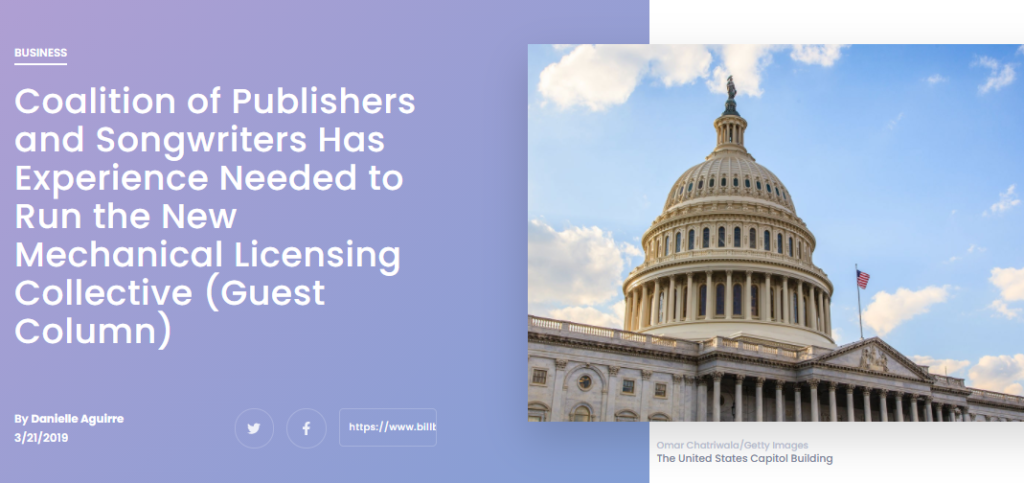Media
Aguirre: Coalition of Publishers and Songwriters Has Experience Needed to Run the New Mechanical Licensing Collective (Billboard)

By Danielle Aguirre | March 21, 2019 10:00 AM EDT
Last October, a huge finish line was crossed when the Music Modernization Act (MMA) became law, updating archaic copyright policy to help songwriters earn what they deserve in the streaming age. While great progress was made, in many ways the bill passing just began what is a long path towards paying songwriters correctly and fairly.
The passage of MMA essentially directed our industry to get moving on the core compromise that is the foundation of the bill -- building a collective to administer mechanical rights that is governed by music publishers and songwriters and funded by digital interactive streaming services.
This week, an industry-leading coalition of songwriters and publishers, led by its representatives -- the National Music Publishers' Association (NMPA), the Nashville Songwriters Association International (NSAI) and the Songwriters of North America (SONA) -- is submitting our plan for creating the Mechanical Licensing Collective (MLC) to the Copyright Office to become the entity envisioned by the MMA.
Our MLC submission sets forth a roadmap to establishing and creating a new licensing entity that can administer and pay mechanical royalties, and fulfill the extensive requirements of the law, by the statutory launch date of January 1, 2021. It's an aggressive timeline that demands comprehensive industry participation.
The MLC, and the submission being filed Thursday (March 21), represent the input and collective effort of much of the same coalition that worked together to pass the MMA. Together, they represent experienced stakeholders from across the music industry, including songwriter groups, major and indie music publishers, digital streaming services and technology experts that have come together to build a framework for a forward-looking and transparent technology company that can respond to the challenges of mechanical licensing in the digital era.
Our MLC will be led by its board of directors and statutorily-created advisory committees, comprised of music publisher and songwriter copyright owners with decades of experience and expertise in the music industry. These music publisher and songwriter representatives bring to the collective relevant and important skills in operations, music licensing and technology, as well as differing life experiences and backgrounds.
Importantly, they were chosen through open, competitive processes. Both the music publisher and songwriter board and committee members were selected by separate panels of well-respected individuals in their respective industries. The panels thoroughly vetted the candidates to ensure that those selected reflect and will advocate for the entirety of their communities, while using their expertise to serve and fulfill the serious responsibilities entrusted to them.
Our MLC's goal is to improve what has become a broken process for administering and paying digital streaming royalties. The coalition of copyright owners establishing MLC has already begun work to ensure a new era of license administration that is modern, efficient, transparent and representative. To this end, MLC has retained a leading independent business consulting firm to develop an operational and technology strategy that will ensure the MLC's efficiency and success. It has also engaged -- with the help of board and committee members and consultants with substantial technology expertise -- in a global search to identify the best technology and vendor partners that can assist it in meeting its matching, distribution and data management goals.
A key component of the MLC will be a central database of musical work ownership that is transparent, accessible to the public and allows copyright owners to identify and claim ownership of their songs. This dynamic database will revolutionize mechanical licensing and usher in a new era of data access, sharing, standardization, accuracy and completeness.
The most critical piece of this process is the industry's support. The MMA requires that the collective designated by the Copyright Office is "endorsed by, and enjoys substantial support from, musical work copyright owners that together represent the greatest percentage of the licensor market for uses of such works in covered activities." As the true industry consensus collective, with a submission representing a true consensus proposal, our MLC not only meets but exceeds this statutory standard.
Our MLC is supported and endorsed by songwriters and music publishers of all sizes that own the relevant mechanical rights in musical works of all genres and from all eras, as well as by all major U.S. music organizations and associations. This includes thousands of songwriters who stepped up to support the MLC. Songwriter advocates like Ross Golan, Ryan Tedder and busbee, who were instrumental in the effort to get the Music Modernization Act passed unanimously by both houses of Congress and eventually signed into law, are advocates of the consensus MLC bid.
Further, to date over 130 music publishing companies have endorsed the MLC industry consensus submission. Together these companies own millions of copyrights and administer millions more, while representing the vast majority of the music publisher market.
Beyond these supporters, our collective is backed by 26 other major music organizations including the Recording Industry Association of America (RIAA), the American Association of Independent Music (A2IM) and all of the major record labels. The Copyright Alliance and SoundExchange, among many others, have voiced their support and critically, our MLC is endorsed by the American Society of Composers, Authors and Publishers (ASCAP), Broadcast Music Inc. (BMI), SESAC and Global Music Rights (GMR) -- encompassing all of the performance rights organizations.
The copyright owners, individuals and entities who have endorsed and have pledged to support the MLC recognize that it is not just the best, but the only entity qualified to be designated as the mechanical licensing collective authorized by the MMA which has the primary purpose of identifying owners of rights in musical works and getting digital royalties into the hands of those to whom those they rightfully belong.
Getting to this point has required years of planning, lobbying, building and compromising, but we will only succeed in our quest for a better licensing system for songwriters and streaming companies if we work together throughout this process. Once the entity which will assume the role of administering mechanical licenses is chosen -- that entity will require the collective brain power of the best tech and creative minds in the business.
Doing something unprecedented requires courage and, most of all, collaboration. We are grateful for the coalition that has come together to create this roadmap and we look forward to the challenge of building a better music industry together. Let's get to work.
Danielle Aguirre is executive vp and general counsel for the National Music Publishers' Association (NMPA) which represents American music publishers and their songwriting partners. She was instrumental in the drafting of the Music Modernization Act and was a 2018 Billboard Women in Music Executive of the Year.
